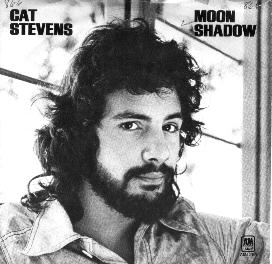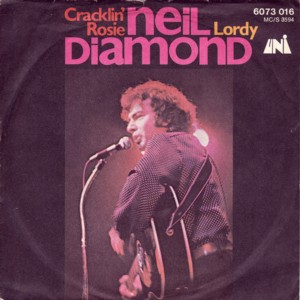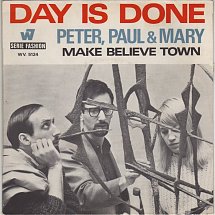Related Research Articles
White Whale Records was an American independent record label, founded in 1965 by Ted Feigin and Lee Lasseff in Los Angeles, California, and probably best known as the record label of The Turtles and a handful of one-hit wonder bands.

"Never Can Say Goodbye" is a song written by Clifton Davis and originally recorded by the Jackson 5. The song was originally written and intended for the Supremes; however, Motown decided it would be better for the Jackson 5. It was the first single released from the group's 1971 album Maybe Tomorrow, and was one of the group's most successful records. It has been covered numerous times, most notably in 1974 by Gloria Gaynor and in 1987 by British pop group the Communards.

"If" is a song written by American singer-songwriter David Gates in 1971. Originally popularized by his group Bread, "If" charted at No. 4 on the U.S. Billboard Hot 100 when released as a single in 1971 and No. 6 in Canada. It also spent three weeks at No. 1 on the U.S. Easy Listening chart, and one week at the top of the Canadian AC chart.
"For All We Know" is a soft rock song written for the 1970 film Lovers and Other Strangers, with music by Fred Karlin and lyrics by Robb Wilson and Arthur James. Both Royer and Griffin were founding members of the soft rock group Bread. It was originally performed, for the film's soundtrack, by Larry Meredith. The best known version of the song is by American pop duo the Carpenters which reached No. 3 on the US Billboard Hot 100 chart and No. 1 on the US Billboard Easy Listening chart in 1971. The song was also a hit for Shirley Bassey at the same time in the United Kingdom. It has since been covered by various artists, including Petula Clark.
Liz Damon's Orient Express was an American soft rock band from Hawaii, featuring lead singer Liz Damon, two female backup singers and a rotating backup band. The name apparently derived from the original backup band being entirely Asian. Their only song to make the Top 40 was "1900 Yesterday", which made it to No. 33 on the U.S. Billboard Hot 100, and No. 15 on the Canadian charts in early 1971. Most impressively, it peaked at No. 4 on Billboard's Easy Listening survey.

"Moonshadow" is a song written and performed by Cat Stevens, first released as a single in the UK in 1970 on the Island label and in the US in 1971 on the A&M label. It also appears on Stevens' 1971 album Teaser and the Firecat.

"Yesterday Once More", written by Richard Carpenter and John Bettis, is a hit song by the Carpenters from their 1973 album Now & Then. Thematically the song concerns reminiscing about songs of a generation gone by. It segues into a long medley, consisting of eight covers of 1960s tunes incorporated into a faux oldies radio program. The work takes up the entire B-side of the album.
"Chanson D'Amour" is a popular song written by Wayne Shanklin. A 1977 recording by the Manhattan Transfer was an international hit, reaching number one on the UK Singles Chart.

"If You Could Read My Mind" is a song by Canadian singer-songwriter Gordon Lightfoot. Lightfoot wrote the lyrics while he was reflecting on his own divorce. It reached No. 1 on the Canadian Singles Chart on commercial release in 1970 and charted in several other countries on international release in 1971. In 2023, Hockey Night in Canada used the song for their year end playoff montage commemorating the Vegas Golden Knights' Stanley Cup win, following Lightfoot's passing.

"Cracklin' Rosie" is a song written and recorded by Neil Diamond in 1970, with instrumental backing by Los Angeles session musicians from the Wrecking Crew, including Hal Blaine on drums, Larry Knechtel on keyboards, Joe Osborn on bass, Al Casey on guitar and Gene Estes on percussion – arranged by Don Randi. The song was included on Diamond's album Tap Root Manuscript. In October 1970 the song became Diamond's first American No. 1 hit within the Billboard Hot 100, and his third to sell a million copies. It was his breakthrough single on the UK Singles Chart, reaching No. 3 for four weeks in November and December. Billboard ranked the record as the No. 17 song of 1970. It also reached No. 2 in both the Australian Singles Chart and the Irish Singles Chart. Its best performance was in New Zealand, where it stayed at No. 1 for five weeks at the end of the year.

"Don't Pull Your Love" is the debut single by Hamilton, Joe Frank & Reynolds which became a top ten hit single in 1971. The song was written by Brian Potter and Dennis Lambert.

"Just One Look" is a song co-written by American R&B singers Doris Troy and Gregory Carroll. The recording by Doris Troy was a hit in 1963. The Hollies, Anne Murray, Linda Ronstadt and Iain Matthews each achieved great success with the song. There have also been many other versions.

"Never My Love" is a pop standard written by American siblings Don and Dick Addrisi, and best known from a hit 1967 recording by the Association. The Addrisi Brothers had two Top 40 hits as recording artists, but their biggest success as songwriters was "Never My Love". Recorded by dozens of notable artists in the decades since, in 1999 the music publishing rights organization Broadcast Music, Inc. (BMI) announced it was the second most-played song on radio and television of the 20th century in the U.S.

"Only Love Can Break a Heart" is a popular song from 1962, performed by the American singer-songwriter Gene Pitney. The song was written by Hal David (words) and Burt Bacharach (music) and appears on Pitney's second album Only Love Can Break a Heart.

"That Same Old Feeling" is the title of a pop song composed by John Macleod and Tony Macaulay which in 1970 was a Top Ten UK hit for Pickettywitch, an English band fronted by Polly Brown. In the US the Pickettywitch single vied with a rival version by The Fortunes, with both versions scoring well-enough regionally to reach the Top 70 of the Hot 100, the national hit parade maintained by Billboard magazine.

"Me and You and a Dog Named Boo" is the 1971 debut single by Lobo. Written by Lobo under his real name Kent LaVoie, it appears on the Introducing Lobo album.
"With Pen in Hand" is a song written by Bobby Goldsboro and first released on his March 1968 album, Honey. The song's lyrics address the subjects of divorce and losing custody of one's child, and are sung from the perspective of the parent who expects to be losing custody of their child, as they make a final plea to their spouse to reconcile before the divorce is finalized. "With Pen in Hand" has been a hit for multiple artists in the late 1960 and 1970s.

"Day Is Done" is a song written by Peter Yarrow. It was recorded by Yarrow's group Peter, Paul and Mary and released as a single in 1969. An anti-war protest song of the Vietnam War era, the song reached No. 21 on Billboard Hot 100, and was ranked No. 48 on the Billboard year-end Top Easy Listening Singles chart of 1969.

"Winter World of Love" is a song recorded by Engelbert Humperdinck, which was released on his eponymous album and as a single in 1969.

"Easy Come, Easy Go" is a song written by Jack Keller and Diane Hildebrand that was a hit single for Bobby Sherman in 1970.
References
- 1 2 1900 Yesterday - By: Liz Damon's Orient Express, MusicVF.com. Retrieved February 27, 2019.
- 1 2 Lonergan, David F. Hit Records, 1950-1975 . Scarecrow Press. p. 160. Retrieved February 27, 2019.
- ↑ "There'll Come a Time – Betty Everett". AllMusic . Retrieved February 27, 2019.
- ↑ "White Whale Gets Express Product", Billboard , December 12, 1970. p. 3. Retrieved March 22, 2018.
- ↑ "Liz Damon's Orient Express – Liz Damon's Orient Express / Liz Damon". AllMusic . Retrieved March 22, 2018.
- ↑ Hot 100 - Liz Damon's Orient Express 1900 Yesterday Chart History, Billboard.com. Retrieved March 22, 2018.
- ↑ Billboard Hot 100, Week of February 13, 1971 – Billboard.com. Retrieved May 24, 2023.
- ↑ Adult Contemporary - Liz Damon's Orient Express 1900 Yesterday Chart History, Billboard.com. Retrieved March 22, 2018.
- ↑ "Easy Listening", Billboard , February 13, 1971. p. 29. Retrieved March 22, 2018.
- ↑ Cash Box Top 100, Cash Box , February 20, 1971. p. 4. Accessed July 13, 2016.
- ↑ "RPM 100 Singles", RPM Weekly , Volume 14, Ed. 26, February 13, 1971. Accessed September 23, 2015
- ↑ "RPM MOR Playlist", RPM Weekly , Volume 14, Ed. 22, January 16, 1971. Accessed September 23, 2015
- ↑ "Top Easy Listening Singles", Billboard , December 25, 1971. TA-38. Retrieved March 21, 2018.
- ↑ "The Singles Chart", Record World , February 13, 1970. Retrieved March 22, 2018.
- ↑ "Top Non-Rock", Record World , February 13, 1970. p. 20. Retrieved March 22, 2018.